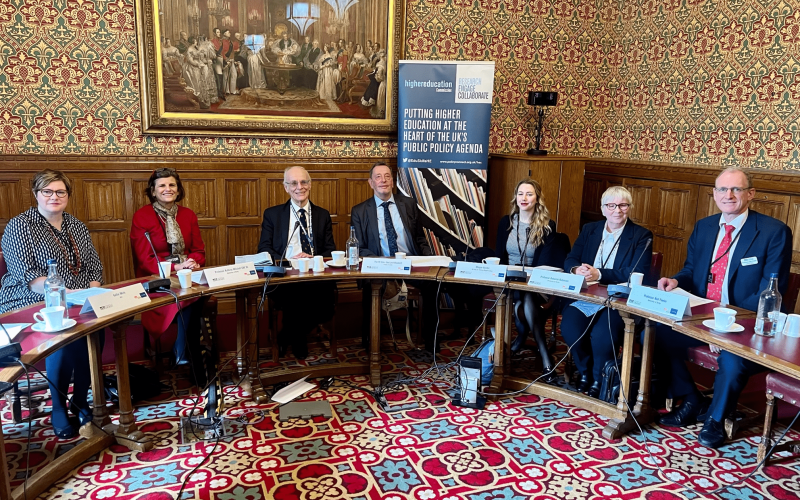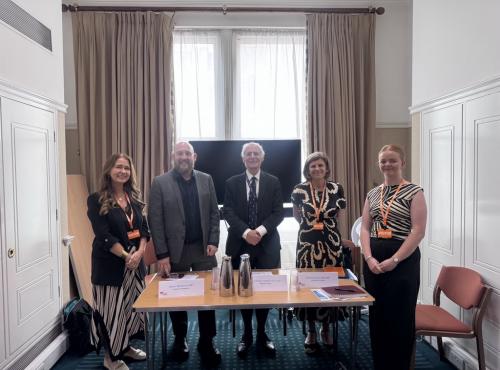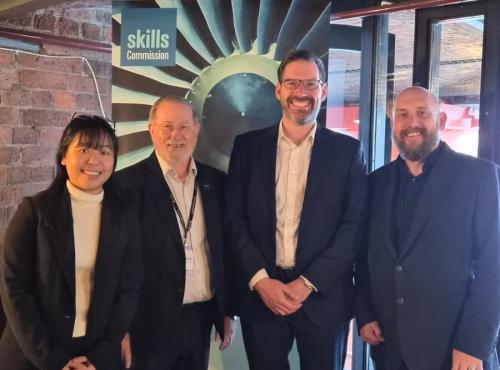Assessing progress towards improving disabled students’ experiences in higher education
On 22 March 2023, the University of Derby and the Higher Education Commission at Policy Connect held a parliamentary event, chaired by Professor Philip Lord Norton of Louth, to assess what progress has been made towards improving the experience of disabled students in higher education.
This follows on from the report “Arriving at Thriving: Learning from disabled students to ensure access for all”, which sought to uncover the reasons for continued disparity in higher education regarding the representation of disabled students, the quality of their experience, and their attainment, continuation, and graduate outcomes.
Since the report's launch in October 2020, policymakers have heeded calls for greater co-ordinated support between HE and employment by piloting an 'adjustments passport', while planned reforms to the Disabled Students' Allowance scheme remains a topic of interest for the sector.
On 22 March 2023, report co-chairs the Rt Hon. The Lord Blunkett, former Secretary of State for Education; Professor Philip Lord Norton; and Vice-Chancellor of the University of Derby Professor Kathryn Mitchell CBE DL reconvened the Higher Education Commission and its stakeholders to discuss recent developments and emphasise the need for a continued focus on the topic. In particular, they reiterated the importance of senior leadership responsibility and accountability to the audience of policymakers, academics, and accessibility leaders. However, this must be complemented by culture change and leadership at all institutional levels to avoid tokenistic, remedial actions which do not address the underlying issues.
Led by Professor Kathryn Mitchell CBE DL, presentations from the University of Derby showed the institution’s success in eliminating both the continuation and attainment gaps for students with a disability, resulting in enhancements in degree outcomes. Professor Neil Fowler, Associate Provost Learning & Teaching at the University of Derby, presented evidence that the University has taken a holistic approach to embedding the recommendations made in “Arriving at Thriving” and in so doing successfully reduced inequality for its disabled students.
The discussion on 22 March, however, revealed that successes at individual university level are still to be met by sector-wide improvements to reduce regional variation and an imbalance in resource distribution. As shown by Professor Deborah Robinson, a researcher in Special Educational Needs, Disability and Inclusion based at the University of Derby, another focus must be on promoting successful transitions into graduate employment through, for example supported internships. This will require substantial efforts in co-production and collaboration between academic institutions and industry, underpinned by a strong focus on students’ voices and supported by policy reform that fosters accessibility by design.
Professor Kathryn Mitchell CBE DL said:
“The event provided an excellent opportunity to reflect on the report’s recommendations and to celebrate where significant progress has been made for students at the University of Derby, particularly in relation to eliminating the continuation and attainment gaps. Centring the student voice and experience in this work is critical if we are to achieve greater progress across the sector. It is essential that we continue to take a holistic approach to removing barriers for disabled students, recognising that the challenges they face are administrative, not intellectual.”
Notes to Editors
About the Higher Education Commission
The Higher Education Commission is part of Policy Connect’s Education and Skills team. The Higher Education Commission is an independent body made up of leaders from the education sector, the business community, and the three major political parties. The Commission examines higher education policy, holds evidence-based inquiries, and produces written reports with recommendations for policymakers. Previous reports by the Higher Education Commission have investigated degree apprenticeships, international exports, postgraduate education, the regulation of higher education, the financial sustainability of the sector, learning analytics, and diversity of provision. The Commission is chaired by Professor Philip Lord Norton of Louth, a Conservative peer and academic and is generously supported by University Partnerships Programme, ACCA, and Jisc.
About Policy Connect
Policy Connect is a cross-party think tank. We specialise in supporting parliamentary groups, forums and commissions, delivering impactful policy research and event programmes and bringing together parliamentarians and government in collaboration with academia, business and civil society to help shape public policy in Westminster and Whitehall, so as to improve people’s lives. Our work focusses on five key policy areas which are: Education & Skills; Industry, Technology & Innovation; Sustainability; Health; and Assistive & Accessible Technology. We are a social enterprise and are funded by a combination of regular annual membership subscriptions and time-limited sponsorships. We are proud to be a Disability Confident and London Living Wage employer, and a member of Social Enterprise UK.
About the University of Derby
The University of Derby is an ambitious, innovative and modern university offering industry-relevant, expert teaching, from foundation and undergraduate degrees to postgraduate study and research. Derby’s academic strength is backed up by practical experience to ensure its students are ready for a successful career, wherever their talents lie. With more than £200 million invested in the last ten years, the University offers some of the best university facilities in the UK, including a Nuclear Skills Academy, developed in partnership with Rolls-Royce Submarines Ltd, STEM Centre, Forensic Training Facility and NHS-standard hospital ward. A new city-centre based Derby Business School, part of the University’s broader vision to expand its reach and reputation across the UK and globally, is also being developed. This landmark building is proposed to be net zero carbon in construction and operation, aligning to the University’s sustainability strategies and its low carbon expertise and research agenda. At Derby, academic expertise, world-leading research and innovation is used to foster talent, support skills development and promote links with businesses regionally, nationally and globally. As well as traditional degree routes, the University offers apprenticeships from levels 2-7 for a wide range of job roles, working with high profile employers including Rolls-Royce, the NHS and the Institute of Quarrying. In addition, continuing professional development, knowledge transfer and sector-leading online courses create opportunities for individuals, employers and communities to develop and flourish. The University is committed to working with partners to support social mobility, opening the doors to lifelong learning opportunities for anybody who wishes to progress their education. This has been recognised though the University’s involvement in the city of Derby’s membership of the UNESCO Global Network of Learning Cities and its vision for inclusive lifelong learning that truly puts Derby on the world map as an exemplar of best practice.
This event was kindly supported by the Derby Impact Collaboration and Engagement (DICE) Network and sponsored by the University of Derby Policy QR Fund. To find out about DICE, visit: https://www.derby.ac.uk/research/how-research-is-managed/derby-impact-collaboration-engagement-network/
Follow @Policy_Connect
Please contact communications [at] policyconnect.org.uk (communications[at]policyconnect[dot]org[dot]uk) or pressoffice [at] derby.ac.uk (pressoffice[at]derby[dot]ac[dot]uk) for enquiries.





